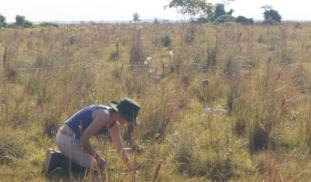403
-8
19
References
- 1. Cerling, T. E., Quade, J., Wang, Y., & Bowman, J. R. (1989). Carbon isotopes in soils and palaeosols as ecology and palaeoecology indicators. Nature, 341(6238), 138–139. doi:10.1038/341138a0
- 2. Davis, M. B. (1963). On the theory of pollen analysis. American Journal of Science, 261(10), 897–912. doi:10.2475/ajs.261.10.897
Please wait...
About This Project
Phytoliths are microscopic silica particles produced by plants that can be easily fossilized and preserved in millions-of-year-old sediments and soils. We test the hypothesis that phytoliths found in the soil of a Savanna in Colombia reflect the surrounding local vegetation. If our hypothesis is correct we can use phytolith analysis for detailed reconstructions of past landscape in order to better understand relationships between past biodiversity, ecosystems, and climate.

Browse Other Projects on Experiment
Related Projects
Reconstructing Historical Oyster Filtration in the Guana River Marsh Aquatic Preserve
The Guana River Estuary in northeast Florida is impaired due to excess nutrients, which can fuel eutrophic...
How do California redwood stomata change with height? What are the implications in physiology and taxonomy?
California’s two redwood species presently stand as Earth’s tallest, largest, most carbon-sequestering...
Can we use phytoliths in modern savanna soil to understand past ecosystems?
Phytoliths are microscopic silica particles produced by plants that can be easily fossilized and preserved...





